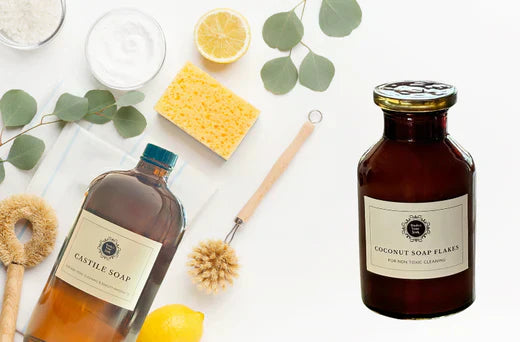
Powder & Liquid Soap for your Cleaning Toolkit
Analisa MaloneAlright, let’s get into some important info, so please stick with me on this journey...
When I first started my DIY cleaning adventure, I went deep into understanding every ingredient in common cleaning products – what they do, and why they’re in there. One function for cleaning that kept popping up was something called a surfactant.
I quickly realised that surfactants are essential in cleaning because they’re the ones that physically lift the ‘dirt’ off the surface. So, I understood I needed a surfactant, but where the heck do I find one?
Off I went, down the rabbit hole, and discovered there are really two main options: soap (made from natural fats and oils) or detergent (made from synthetic ingredients). And no, soap and detergent are not the same thing.
What Is a True Soap?
A true soap, in its purest form, is made through a process called saponification. You mix fats or oils with an alkali, like lye (sodium hydroxide or potassium hydroxide), and the chemical reaction turns them into soap molecules and glycerine. Yep, you can literally turn any fat or oil into soap – even body fat! (Not that I’m suggesting you try that one!)
If you look at soap-making websites, you’ll see a huge list of oils – from coconut and olive to nut oils. Each brings its own qualities and lather, and the combinations are endless. That’s the fun part of making soap from scratch!
Liquid vs. Hard Soap
For DIY beauty and cleaning products, you’ll need a liquid soap for water-based products and a hard soap for powder-based ones. You can’t just dilute a hard soap to make liquid soap – trust me, that’s just soapy water! 😂
I needed both types, so I found liquid Castile Soap (easy to get and often handmade locally – bonus points!) and Coconut Soap Flakes, which saved me the hassle of grating soap bars for my powder creations.
Liquid Castile Soap
Castile Soap gets its name from Castile, Spain, where the purest olive oil-based soap was made. Apparently, even Cleopatra used it! Originally, it was just olive oil, water, and lye, but these days, coconut oil is often added for a better lather. It's simple, pure, and has stood the test of time.
In fact, soap is one of the best preventatives for disease worldwide – once it was introduced, personal hygiene took a huge leap forward!
Castile Soap is super versatile. I use it for:
• Washing dishes
• Hand wash
• DIY cleaning sprays for all surfaces
• Mild laundry wash for wool and delicates
• Bathing my dog, Maxi
• Cleaning my car
• Body wash
• Bubble bath gel
• Shampoo
• Carpet and upholstery cleaning
• Kids' cleaning products
Coconut Soap Flakes
You can grate any soap bar to make powdered soap, but you need to make sure it's a pure soap bar, not a detergent bar in disguised. Plus, many soap bars are made with fancy oils and fragrances, which aren’t necessary for everyday cleaning.
I found the perfect solution – organic Coconut Soap Flakes! Made using just organic coconut oil, water, and lye, these flakes are already grated into tiny ball shapes, making them perfect for adding to your DIY cleaning recipes. I use it for
- Add a dash to my handmade dish powder
- To make cleaning pastes
- To wash dishes in the sink
- In my Laundry Powder
- For washing delicates
- Dilute for soapy water to wash anything!
A soap made with only coconut oil is a little harsher for use on the skin, it can be drying whereas the Castile Soap is actually moisturising on the skin.
Here are some related articles that you may like to read to learn even more about Soap.
Hope you enjoyed the journey, now time to get some DIY ingredients and ditch the detergents!
